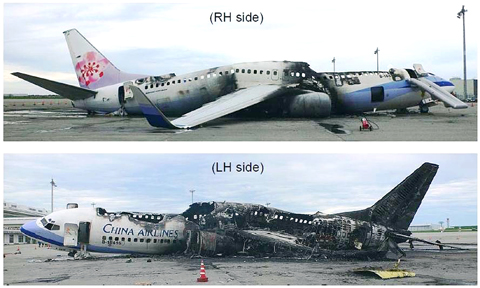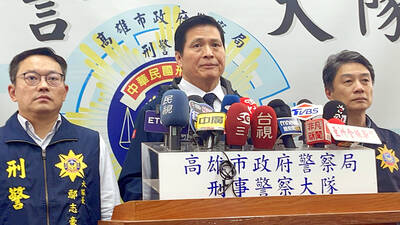A flawed design on a Boeing Co aircraft and maintenance errors by China Airlines (CAL, 華航) staff may have contributed to the explosion of an aircraft at Japan’s Naha International Airport three years ago, the Civil Aeronautics Administration (CAA) said yesterday.
The China Airlines Boeing 737-800 aircraft, flight No. CI-120, caught fire soon after it landed in Naha on Aug. 20, 2007. The flight crew quickly evacuated passengers after the pilot identified a fuel leak under the aircraft’s right wing. No passengers or crew died.
Because the incident occurred in Naha, the Convention on International Civil Aviation stipulated that the Japan Transport Safety Board (JTSB) had the right to launch an investigation.

PHOTO PROVIDED BY THE JAPAN TRANSPORT SAFETY BOARD
The board released its official investigation report yesterday morning.
Both the CAA and the Aviation Safety Council (ASC) issued official statements yesterday in response to the findings, probable causes and suggestions mentioned in the report.
“The report said the aircraft’s flawed design and the airline’s maintenance errors were the potential causes of the detachment of a downstop assembly and a washer from the main track of a right wing slate,” the CAA said in a statement. “When the slate was retracted [to prepare for landing], the track put pressure on the assembly , causing it to puncture a hole in the track can. Fuel then leaked from the broken track can, leading to the fire and the explosion.”
Aside from the official statement, the ASC also held a press conference on the investigation. ASC officials showed the press the downstop assembly and main track taken from a Boeing aircraft.
“It is presumed that a factor contributing to the detachment of the downstop assembly was the design of the downstop assembly, which would fall off if its washer was not installed,” the ASC said in its presentation, citing the JSTB report.
“With regard to the detachment of the washer … Despite the fact that the nut was in a difficult location to access during maintenance, neither the manufacturer of the aircraft nor the airline had paid sufficient attention to this when preparing the Service Letter and Engineering Order job card. Also, neither the maintenance operator nor the job supervisor reported the difficulty of maintaining the nut to the authority that ordered the work,” the ASC statement said.
Regarding the findings, China Airlines spokesperson Bruce Chen (陳鵬宇) said the report did not provide direct evidence that the washer fell off during maintenance.
“After the incident, many countries have issued airworthiness directives on the same type of aircraft,” he said.
“We have started inspecting our aircraft since August last year. The inspection will end with an endoscopic review of the downstop assembly,” he said.
Meanwhile, maintenance workers must also report the difficulties they encounter while carrying out maintenance work,” Chen said.
He added that the aircraft that exploded in Naha was covered by an insurance policy, and the insurance firm would decide on whether to make a claim on Boeing.
However, the cost of replacing aircraft parts should be covered by Boeing, he said. Boeing also changed the design of the downstop assembly, which included enlarging the size of the washer, adding a pin at the end of the assembly and changing the inner diameter of the assembly into a circle.

Twenty-four Republican members of the US House of Representatives yesterday introduced a concurrent resolution calling on the US government to abolish the “one China” policy and restore formal diplomatic relations with Taiwan. Led by US representatives Tom Tiffany and Scott Perry, the resolution calls for not only re-establishing formal relations, but also urges the US Trade Representative to negotiate a free-trade agreement (FTA) with Taiwan and for US officials to advocate for Taiwan’s full membership in the UN and other international organizations. In a news release announcing the resolution, Tiffany, who represents a Wisconsin district, called the “one China” policy “outdated, counterproductive

Actress Barbie Hsu (徐熙媛) has “returned home” to Taiwan, and there are no plans to hold a funeral for the TV star who died in Japan from influenza- induced pneumonia, her family said in a statement Wednesday night. The statement was released after local media outlets reported that Barbie Hsu’s ashes were brought back Taiwan on board a private jet, which arrived at Taipei Songshan Airport around 3 p.m. on Wednesday. To the reporters waiting at the airport, the statement issued by the family read “[we] appreciate friends working in the media for waiting in the cold weather.” “She has safely returned home.

ON PAROLE: The 73-year-old suspect has a criminal record of rape committed when he was serving in the military, as well as robbery and theft, police said The Kaohsiung District Court yesterday approved the detention of a 73-year-old man for allegedly murdering three women. The suspect, surnamed Chang (張), was arrested on Wednesday evening in connection with the death of a 71-year-old woman surnamed Chao (趙). The Kaohsiung City Police Department yesterday also unveiled the identities of two other possible victims in the serial killing case, a 75-year-old woman surnamed Huang (黃), the suspect’s sister-in-law, and a 75-year-old woman surnamed Chang (張), who is not related to the suspect. The case came to light when Chao disappeared after taking the suspect back to his residence on Sunday. Police, upon reviewing CCTV

TRUMP ERA: The change has sparked speculation on whether it was related to the new US president’s plan to dismiss more than 1,000 Joe Biden-era appointees The US government has declined to comment on a post that indicated the departure of Laura Rosenberger as chair of the American Institute in Taiwan (AIT). Neither the US Department of State nor the AIT has responded to the Central News Agency’s questions on the matter, after Rosenberger was listed as a former chair on the AIT’s official Web site, with her tenure marked as 2023 to this year. US officials have said previously that they usually do not comment on personnel changes within the government. Rosenberger was appointed head of the AIT in 2023, during the administration of former US president Joe